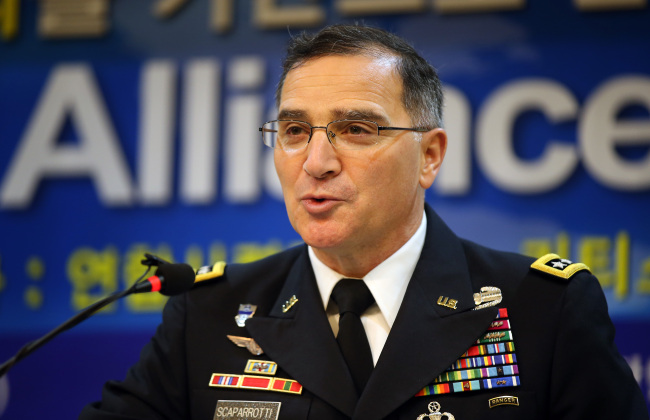U.S. Forces Korea Commander Gen. Curtis Scaparrotti on Tuesday expressed concern over North Korea’s development of asymmetric military capabilities, noting that Pyongyang was making “progress.”
“Kim Jong-un, unlike his father, is overconfident and unpredictable. Realizing he cannot win in a conventional war, he has focused his military’s development on training on asymmetric capabilities,” he said during his lecture at the Association of the Republic of Korea Army.
“Our top concern is that we have very little warning of an unprovoked asymmetric attack which could start a cycle of action and counter-action, leading to an escalation. This underscores the need for the alliance to maintain a high level of readiness and vigilance.”
“Kim Jong-un, unlike his father, is overconfident and unpredictable. Realizing he cannot win in a conventional war, he has focused his military’s development on training on asymmetric capabilities,” he said during his lecture at the Association of the Republic of Korea Army.
“Our top concern is that we have very little warning of an unprovoked asymmetric attack which could start a cycle of action and counter-action, leading to an escalation. This underscores the need for the alliance to maintain a high level of readiness and vigilance.”

Asymmetric capabilities include nuclear arms and cybercapabilities that cannot easily be countered with conventional weapons. Amid its international isolation that has damaged its economy, North Korea has pushed to raise those capabilities.
Touching on the allies’ recent agreement on a “conditions-based” transfer of wartime operational control, the commander listed a series of capabilities the allies should work on together to enable the South to retake control.
These critical capabilities include command, control, communications, computers and intelligence, or C4I; ballistic missile defense, or BMD; critical munitions; and intelligence, surveillance, and reconnaissance, or ISR.
“Through close consultation, we will continue to develop capabilities that are effective, interoperable, and timely, in order to maintain our readiness and deterrence against North Korea,” said Scaparrotti, who also heads the allies’ Combined Forces Command and the U.N. Command.
As to the recent agreement to temporarily station the CFC in its current location until the OPCON transfer takes place, which may not happen before the mid-2020s, the commander pointed out that the CFC will keep only the “minimum necessary personnel and infrastructure.”
After the agreement was announced last month, some critics raised concerns that the plan to station it in the current location, albeit temporarily, could get in the way of a plan to build a national park there.
Asked if the commander could consider stationing the CFC in South Korea’s Joint Chiefs of Staff building in Seoul instead of retaining it in the current position, the commander noted that there would be some operational difficulties should the CFC be moved into the JCS building.
“I would tell you that there are some unique requirements in order to command and control this theater that can’t be met by simply moving into the JCS headquarters,” he said. “But this alliance is built on trust and candid communication, and I am confident that together, we will find the right solution.”
Speaking of the long-standing alliance, the USFK chief portrayed it as “unique.”
“I am really struck by the quality of the alliance. I have been in several alliances in my career and this is a unique one because of the length of this alliance and the fact that it was born in combat and stood the test of the time and many sacrifices together,” he said.
Gen. Scaparrotti has been in the current post since October 2013. He has served in key leadership positions at the tactical, operational, and strategic level of the U.S. military to include Director of Operations, the U.S. Central Command. He has commanded forces in Iraq, Afghanistan, Rwanda, Bosnia and Liberia.
By Song Sang-ho (sshluck@heraldcorp.com)
-
Articles by Korea Herald



![[Exclusive] Korean military set to ban iPhones over 'security' concerns](http://res.heraldm.com/phpwas/restmb_idxmake.php?idx=644&simg=/content/image/2024/04/23/20240423050599_0.jpg&u=20240423183955)




![[Herald Interview] 'Amid aging population, Korea to invite more young professionals from overseas'](http://res.heraldm.com/phpwas/restmb_idxmake.php?idx=644&simg=/content/image/2024/04/24/20240424050844_0.jpg&u=20240424200058)
![[Pressure points] Leggings in public: Fashion statement or social faux pas?](http://res.heraldm.com/phpwas/restmb_idxmake.php?idx=644&simg=/content/image/2024/04/23/20240423050669_0.jpg&u=)










